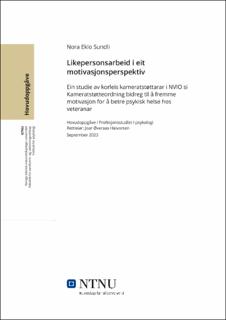| dc.contributor.advisor | Halvorsen, Joar Øveraas | |
| dc.contributor.author | Sundli, Nora Eklo | |
| dc.date.accessioned | 2023-12-26T18:19:19Z | |
| dc.date.available | 2023-12-26T18:19:19Z | |
| dc.date.issued | 2023 | |
| dc.identifier | no.ntnu:inspera:136848255:23022204 | |
| dc.identifier.uri | https://hdl.handle.net/11250/3108889 | |
| dc.description.abstract | Bakgrunn: Det å oppleve krig i internasjonale operasjonar er noko som kan skape traumar og andre helsemessige utfordringar. Sjølv om 80% ikkje er plaga etter teneste, viser forsking at 72,4 % av veteranar som møter kriteria til ein psykisk liding ikkje tek kontakt med helsevesenet. Stigmatisering kan vere ei årsak. Det er ei oppfatning at veteranar kun vil snakke med andre veteranar. Målet med denne oppgåva har derfor vore å utvikle meir kunnskap om tematikken likepersonsarbeid i eit motivasjonsperspektiv. Metode: Eg svarer på problemstillinga korleis bidreg kameratstøttarane til å fremme motivasjon for å betre psykisk helse hos veteranar gjennom tre valde forskingsspørsmål. Der eg (1) undersøker korleis dei opplever å vere rusta til å skape gode relasjoner til vetaranane, og dernest (2) korleis dei opplever at relasjonen kan brukast for å fremme ei betre psykisk helse. Derfor er ei kvalitativ tilnærming med dybdeintervju vald og fire likepersonar frå Kameratstøtteordninga til Norges Veteranforbund for Internasjonale Operasjoner (NVIO) intervjua. Eg vurderar til slutt (3) korleis svara frå spørsmål (1) og (2) samsvarer med motivasjonsteorien sjølvbestemmingsteorien. For å gjere funna i størst mogleg grad allmenngjerbare ble datamaterialet analysert systematisk med ein stegvis deduktiv induktiv metode (SDI-metoden) i tillegg til at eg prøvde å vere særs transparent i skildringa av metodisk framgangsmåte. Resultat: Gjennom SDI-metoden har eg identifisert fire empirisk utleda hovudfunn, som viser at kameratstøttarane opplever å ha ein unik tillit i relasjon til veteranane. Dei bruker tilliten til å innfri tryggleik og bryt barrierer veteranane har. Til same tid som kameratstøttarane òg opplever å vere sårbare hjelpare. Etter å ha analysert dei tre første nemnde empirisk utleda funna i valde teoriar om terapeutisk allianse, sosial støtte og motivasjonsteorien sjølvbestemming blei funna utvikla til meir allmenngjerbare konsept. Der alliansen mellom kameratstøttarane og veteranane kan sjåast som ei tillitsbasert tilknytning som gjer det mogleg med brubygging til helsevesen og samfunnet, til same tid som dei òg representerar ein emosjonell tryggleik. Konklusjon: Sammenstilling av funna mot behov for tilknytning, kompetanse (meistring) og autonomi slik sjølvbestemmingsteorien hevdar gjer indre motivasjon, skapar eit inntrykk av at kameratstøttarane har moglegheit til å auke veteranane sin indre motivasjon til å få ei betre psykisk helse gjennom å ha ei tillitsbasert tilknytning, der dei inngir emosjonell tryggleik og er brubyggarar som auker veteranane sin autonomi, meistring og kompetanse til betre sin psykiske helse. | |
| dc.description.abstract | Background: Experiencing war in international operations can create trauma and other health challenges. Although 80% are not afflicted after service, research shows that 72.4% of veterans who meet the criteria for a mental disorder do not contact the healthcare system. Stigmatization can be a reason. There is a perception that veterans only want to talk to other veterans. The aim of this assignment has therefore been to develop more knowledge about the subject of peer work from a motivational perspective. Method: I answer the question of how the peer supporters contribute to promoting motivation to improve the mental health of veterans through three selected research questions. Where I (1) examine how they feel they are equipped to create good relationships with the veterans, and secondly (2) how they feel that the relationship can be used to promote better mental health. Therefore, a qualitative approach with in-depth interviews was chosen and four equal persons from the Comrade support scheme of the Norwegian Veterans' Association for International Operations (NVIO) were interviewed. Finally, I assess (3) how the answers from questions (1) and (2) correspond to the motivation theory, the self-determination theory. In order to make the findings publicly available to the greatest extent possible, the data material was analyzed systematically with a step-by-step deductive inductive method (the SDI method) in addition to the fact that I tried to be particularly transparent in the description of the methodological procedure. Results: Through the SDI method, I have identified four empirically derived main findings, which show that the comrade supporters experience a unique trust in relation to the veterans. They use the trust to ensure safety and break the barriers the veterans have. At the same time, the peer supporters also experience being vulnerable helpers. After analyzing the first three aforementioned empirically derived findings in selected theories of therapeutic alliance, social support and the motivational theory of self-determination, the findings were developed into more generalizable concepts. Where the alliance between the comrade supporters and the veterans can be seen as a trust-based connection that makes it possible to build bridges to the healthcare system and society, at the same time as they also represent an emotional security. Conclusion: Comparing the findings against the need for connection, competence (mastery) and autonomy, as the self-determination theory claims makes inner motivation, creates an impression that the peer supporters have the opportunity to increase the veterans' inner motivation to have better mental health through having a trust-based attachment, where they instill emotional security and are bridge builders who increase the veterans' autonomy, mastery and competence to improve their mental health. | |
| dc.language | nno | |
| dc.publisher | NTNU | |
| dc.title | Likepersonsarbeid i eit motivasjonsperspektiv | |
| dc.type | Master thesis | |
